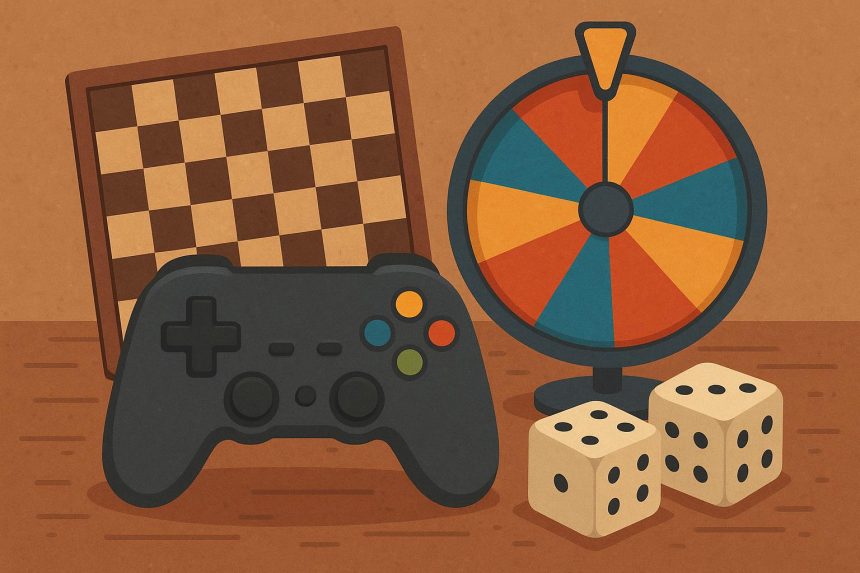The fun of video games is testing one’s skills against the game. A satisfying challenge can only arise from a game that perfectly balances skill and chance. These are two complementary forces that players often mistake as opposing. But the contrast between the two ultimately elevates a game to a modern classic.
The designer’s job is a tough one. But by understanding how they navigate the interaction between skill and luck, we can learn more about the gaming industry. We would like to focus on this balance in our text. We aim to uncover how game design that blends skill and luck can improve player engagement.
Player Agency Hidden by a Layer of Chance
Player agency and randomness are the two significant elements of game design. They are at constant odds with one another, which is why many might think of them as wholly distinct. But the truth is that these two can work together to create magic. There is no other game that better encapsulates the relationship between luck and skill than poker.
Classic card games may not be the first thing people consider when discussing game design. But at the core of poker, it is a truly brilliant concept for a game. The surface-level analysis of poker might lead one to believe that it is all about getting the right hand. But whether you play a game with the unique mechanics of the Omaha Hi-Lo poker online game or a standard Texas Hold’em; you quickly learn that there is much more to poker than simple chance.
That is one of the most intriguing approaches to blending player agency and randomness. The game designers purposefully hid the player agency side of the game behind layers of luck. That way it is all the more rewarding when players discover that there is more to this game than simple luck. Plenty of modern game designers take this concept and run with it; which helps them to create impressive titles that resonate with fans from all over the world.
Chance Incorporated in Skill-based Games
Player agency can be hidden beneath a thin veneer of luck. But there are plenty of games that take the opposite approach. They are built up as games of skill and nothing more. But luck always plays a role. The most obvious example of luck being incorporated in a game primarily of skill is the role-playing game. Roleplaying games have always stood as a monument to the combination of player agency and pure random chaos, whether MMOs or classic board games.
The role-playing games today have a common ancestor in Dungeons & Dragons. D&D has grown a lot more popular today than ever before. We have television shows like The Big Bang Theory and Stranger Things to thank for that. These shows introduced the game to a mainstream audience that quickly saw the appeal of custom awards, worlds and characters. Building a character and navigating the mystical world crafted by the Dungeon Master takes a lot of skill and knowledge. But at the end of the day, the player can’t do much unless the dice are on their side.
Many may not realize that this is precisely how video game RPGs work, too. We tend to ignore the relevance of dice in titles like Elder Scrolls and Final Fantasy. But the dice’s lack of screen time doesn’t erase their impact on the game. The chance of an attack hitting the target in the RPGs above is based on a random number generator. Its job is to simulate the roll of the dice and lead to an outcome. Those who play these games have certainly noticed a critical hit that comes around once in a while. That is what happens when the RNG works in their favor.
Skilled players can find ways to improve their chances of hitting, bending luck to their side in a way. But at the end of the day, it all comes down to rolling the right number.
Games that Thrive Off Either
The critical thing to know when balancing luck and skill is which games benefit from one or both. Roleplaying games are ultimately reliant on luck. But it takes a lot of skill on a player’s part to twist that luck in their favor. Game designers understand this and do their best to reward a observant player who attempts to hone their skill to the best of their abilities.
But skill should not always be your go-to for improving a game. Slot games, for example have never been about honing a player’s skill or giving them agency. The goal in slots is to spin a reel and hope that it lands the way the player wants. No amount of agency is going to change the spin’s outcome. That is why slot game designers should focus on improving the experience in other ways. When they’ve tried to incorporate skill-based aspects; slot players have responded mainly with groans.
It is important to understand what makes a game work. Only after you do that can you talk about game design and balancing skill and luck. Those who understand the unique relationship between the two forces can learn to bend it to their will quickly.
Lynn Martelli is an editor at Readability. She received her MFA in Creative Writing from Antioch University and has worked as an editor for over 10 years. Lynn has edited a wide variety of books, including fiction, non-fiction, memoirs, and more. In her free time, Lynn enjoys reading, writing, and spending time with her family and friends.















